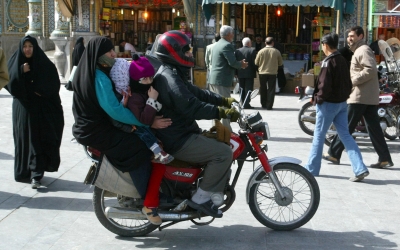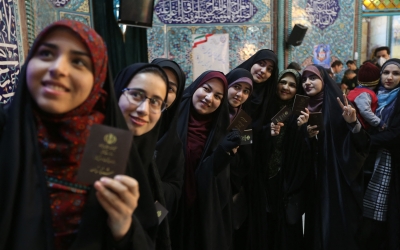Iran: Beheading of teenage wife reignites debates over 'outdated' customs

On 5 February, a video was posted on Iranian social media. It showed a man brandishing a knife and a woman's decapitated head, with him smiling as he walked along a busy street in the southwestern city of Ahvaz, in Khuzestan province.
The man, Sajjad Heydari, was arrested. The Ahvaz prosecutor later said that the murdered woman was Heydari's 17-year-old wife, identified by the media as Mona "Ghazal" Heydari.
The video provoked outrage in Iran, reopening the debate about violence against Iranian women and girls and their lack of legal protection.
New MEE newsletter: Jerusalem Dispatch
Sign up to get the latest insights and analysis on Israel-Palestine, alongside Turkey Unpacked and other MEE newsletters
Ghazal was reportedly 12 years old when she married Heydari, her cousin. According to her father, they obtained a judicial certificate of physical fitness and maturity so that she could marry.
At the age of 14, she gave birth to a son.
Leaving Iran
A few months before her murder, Ghazal reportedly left Iran for Turkey, to marry a Syrian man she had met online.
The Syrian man repeatedly sent pictures of himself with Ghazal to Heydari, who is said to have been enraged and humiliated as a result. The story spread among friends and neighbours.
Based on the statements of Ghazal's father, the Syrian man had told Heydari that Ghazal, who had a miscarriage prior to leaving the country, had in fact had an abortion.
According to both families, Ghazal later regretted her decision to leave and wanted to return to Iran. But she was afraid of her husband.
Eventually, both fathers of the couple - who are brothers - travelled to Turkey to bring Ghazal back to Ahvaz, where they were supposed to hand her over to the police to protect her from Heydari.
"My son had threatened to kill Ghazal, so Ghazal's father and Sajjad's father tried to hide her until she was handed over to the police because they were afraid of Sajjad's threats," Heydari's mother told Fars news agency.
The day after they returned to Iran, while Ghazal's father was not at home, Heydari's father convinced Ghazal to go to the police station earlier than arranged. En route, Heydari and his brother stopped the car and he allegedly beheaded his wife.
Heydari's mother said her son walked into his neighbourhood parading the head of his wife.
In a departure from traditional norms, Ghazal's father said he had filed a lawsuit against his son-in-law and would not forgive him in court.
Both Ghazal and Heydari's fathers belong to a tribe in Ahwaz which would usually try and convince the victim's family to forgive the killer because the crime was allegedly committed in a fit of ghayrah, or zeal. This custom often involves a bereaved family agreeing to forgive the killer in court.
Lawless against femicides
The murder of Ghazal is only the latest example in Iran's string of femicides, where a woman is murdered by her spouse or family. Official statistics categorised 20 percent of murders in Iran as "honour" killings, which roughly translates to around 350 such cases annually.
One killing in 2020 sparked wide public outcry in Iran, when 14-year-old Romina Ashrafi was decapitated with a sickle by her father.
Romina had run away from her home in the northern Gilan province with her 35-year-old boyfriend, after her father objected to their marriage, local media said. The pair was found by police, and Romina was sent home despite reportedly telling them that she feared for her life.

According to Iranian law, if a man or a woman is found guilty of murdering a human being, the individual is to face the punishment of death. But if a father kills his child, he will not be executed. Instead, he will be sentenced to imprisonment for up to 10 years, as well as paying a fine.
In the event, Romina's father was sentenced to just nine years in prison for his crime.
At the time, Masoumeh Ebtekar, vice president for women and family affairs under then-Iranian president Hassan Rouhani, proposed a bill to increase the punishment for fathers who murdered their children. Two years later, parliament still has not discussed the bill, despite promises from MPs to put it on their agenda.
Ebtekar's predecessor, Shahindokht Molaverdi, said at the time that such murders would continue "as long as the law and dominant cultures in local and global communities are not deterring enough".
Who will protect women?
Meanwhile, another bill, entitled "Protecting Women from Violence" and first tabled in parliament more than 10 years ago, still hasn't been passed.
The bill proposes the establishment of a fund by the government to protect women who have been abused or subjected to violence.
It outlines the formation of a fund by the judiciary to support victims of violence, provide teachings on "life and job skills" to imprisoned women, and contributing to the payment of blood money to families of women murdered by men.
If someone helps a woman to flee a home where she faces sexual, physical and psychological dangers, that person will not face any punishment.
The bill was finally approved by Iran's government in January 2021 after many debates and submitted to parliament. Parliament, however, refused to study the bill, referring it to the legal and judicial commission. There is still no news of the bill being passed.
Journalist Marjan Laghaee said in a tweet that parliament's hesitation to pass the bill prohibiting violence against women, combined with the law's passivity about such murders and child marriage, were among the reasons behind the Ghazal murder.
Taboo subjects
The issue of violence against women and the so-called "honour" killings are sensitive issues for the authorities in the Islamic Republic.
The 2012 Kianoush Ayari film The Paternal House, which focused on such killings, was banned for nearly a decade and its creators were prosecuted.
The murder of Ghazal has not only reignited Iranians' fury about such killings but has also reopened the debate around child marriage.
'Ghayrah tells us to provide a means of protecting these people who you care for greatly, not to kill them if they make a mistake'
- Iranian cleric
Shabnam Eskanadari, a social activist, called on the Iranian state to designate child marriage a crime. She tweeted that the law didn't offer protection to women and girls.
Mazyar Baalaei, a reformist political activist, wrote on Twitter: "The reality is that culture cannot be blamed unless an urgent and legal [action is taken] to deal with phenomena such as child-marriage or murders similar to what happened to Ghazal.
"The wrong traditions dating back hundreds of years ago must be restrained by law," he added.
These killings are usually carried out by fathers or other family members, said Nousha Mir Jafari, a lawyer.
"If the husband or brother is the killer and the father is the guardian of the victim, he easily forgives him and the murderer is then subject to article 612," she told local media.
According to article 612, anybody committing murder in these circumstances can expect a prison sentence of three to 10 years.
Ali Motahari, an outspoken former MP, described Ghazal's murder as a test for the judiciary, urging them to execute her husband immediately.
‘Ignorant customs’ in modern times
Some people blame the culture of certain tribes in southwestern Iran for the murder of Ghazal.
"Honour killings have been common among some tribes since ancient times. However, today it is receiving more attention due to its media coverage," a sociologist, who asked to stay anonymous due to fear of repercussions from authorities, told MEE.
"Unfortunately, girls in these areas are under the full control of their father, brother and cousin. If a rumour against a girl who is related to a person spreads in the neighbourhood, whether it's true or false, her death sentence would be issued by her own family."
'When a father who killed his teenage daughter was sentenced to only nine years in prison, it proved that the law alone is not enough, and we must fight culturally against these ignorant customs'
- Iranian sociologist
"Terrible crimes" like this have nothing to do with poverty, the sociologist argued, as the murderer's tribe will pay the blood money to save him from persecution.
"[As in the case of Romina] that we saw two years ago, when a father who killed his teenage daughter was sentenced to only nine years in prison, it proved that the law alone is not enough, and we must fight culturally against these ignorant customs."
The number of "honour" killings in Iran may reach over 500 yearly, with a higher average taking place in the south of the country, said a criminal lawyer who asked to stay anonymous.
Parts of Iran, especially in the south of the country, report a higher number of "honour" killings.
"We know that most of the motives for honour killings are due to beliefs, patriarchal misconceptions and gender inequality. This adherence to a series of traditional beliefs has led us to witness so many honour killings every year," he told MEE.
"In these types of communities and tribes, a woman does not have her own identity. Rather, she is defined by her husband or her brother or her father, who consider themselves as the absolute owner of her," said the lawyer.
"On the other hand, we should not forget the difficult living conditions and economic problems that have contributed to physical and verbal violence, which account for a high percentage of premeditated murders in the country," he added

According to the Centre for Human Rights in Iran, at the core of this crime are "two unaddressed issues in Iran - the lack of protections for violence against women in Iran, and the widespread practice of child marriage. As such, these individual acts of murder are closely tied to government policies."
In addition to lenient punishments for fathers and husbands for violence against girls and women, other aspects of Iranian law compound the problem.
"For example, a woman can't leave the marital home without proof that she's endangered, and, if a woman does flee, she forfeits financial maintenance. Orders of protection do not exist, and shelters for abused women are woefully absent in much of the country.
"In general, the police consider violence by family members to be a 'family matter,'" the group said in a statement released last week.
Meanwhile, a Qom-based cleric who did not want his name disclosed told MEE that many religious concepts have been misunderstood, including the concept of "zeal".
"Religious ghayrah does not allow us to attack our daughters, sisters and wives and risk their lives for the mistakes they have made, even if their mistakes are great and heavy.
"On the contrary, religious ghayrah speaks of honour. It tells us to provide a means of protecting these people who you care for a great deal, not to kill them if they make a mistake."
This article is available in French on Middle East Eye French edition.
Middle East Eye delivers independent and unrivalled coverage and analysis of the Middle East, North Africa and beyond. To learn more about republishing this content and the associated fees, please fill out this form. More about MEE can be found here.





